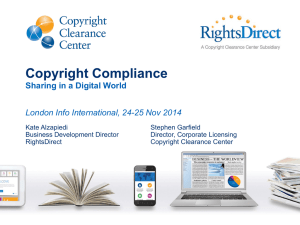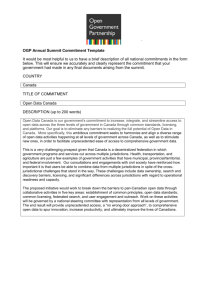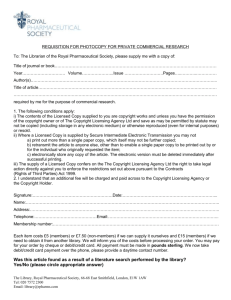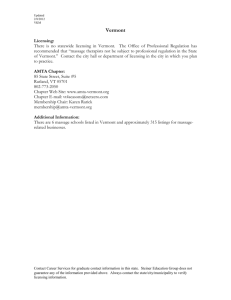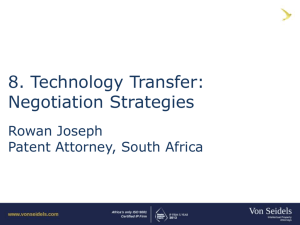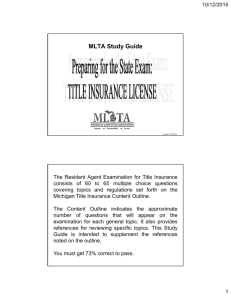Saturday, July 16, 2-3:15pm MANAGEMENT: Music
advertisement
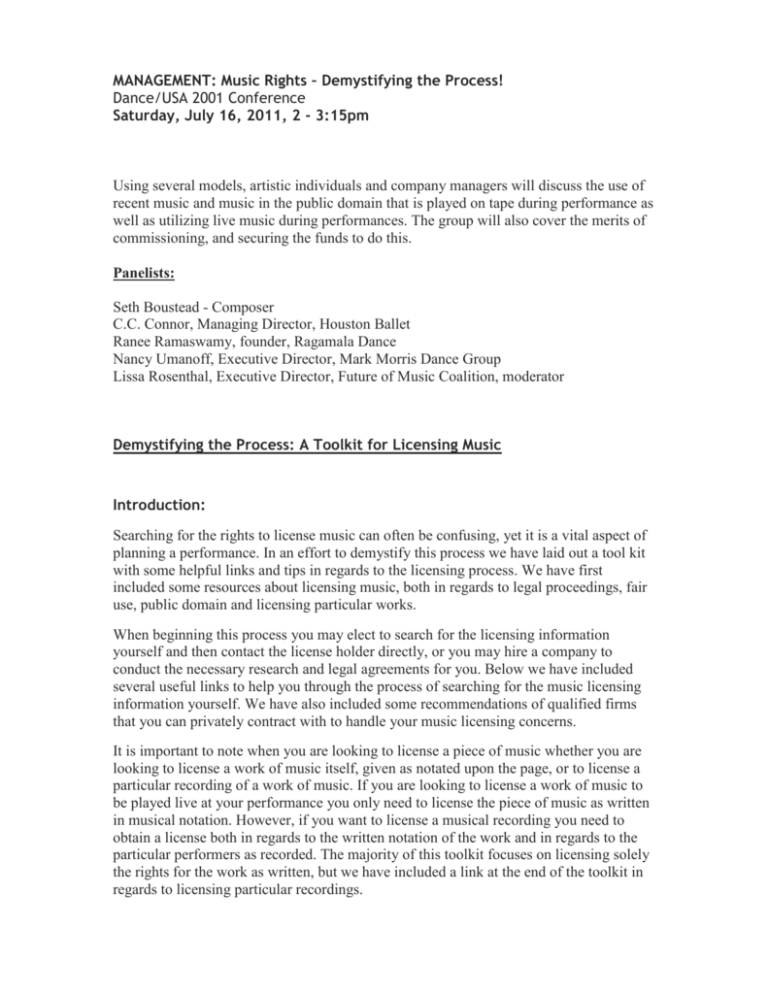
MANAGEMENT: Music Rights – Demystifying the Process! Dance/USA 2001 Conference Saturday, July 16, 2011, 2 - 3:15pm Using several models, artistic individuals and company managers will discuss the use of recent music and music in the public domain that is played on tape during performance as well as utilizing live music during performances. The group will also cover the merits of commissioning, and securing the funds to do this. Panelists: Seth Boustead - Composer C.C. Connor, Managing Director, Houston Ballet Ranee Ramaswamy, founder, Ragamala Dance Nancy Umanoff, Executive Director, Mark Morris Dance Group Lissa Rosenthal, Executive Director, Future of Music Coalition, moderator Demystifying the Process: A Toolkit for Licensing Music Introduction: Searching for the rights to license music can often be confusing, yet it is a vital aspect of planning a performance. In an effort to demystify this process we have laid out a tool kit with some helpful links and tips in regards to the licensing process. We have first included some resources about licensing music, both in regards to legal proceedings, fair use, public domain and licensing particular works. When beginning this process you may elect to search for the licensing information yourself and then contact the license holder directly, or you may hire a company to conduct the necessary research and legal agreements for you. Below we have included several useful links to help you through the process of searching for the music licensing information yourself. We have also included some recommendations of qualified firms that you can privately contract with to handle your music licensing concerns. It is important to note when you are looking to license a piece of music whether you are looking to license a work of music itself, given as notated upon the page, or to license a particular recording of a work of music. If you are looking to license a work of music to be played live at your performance you only need to license the piece of music as written in musical notation. However, if you want to license a musical recording you need to obtain a license both in regards to the written notation of the work and in regards to the particular performers as recorded. The majority of this toolkit focuses on licensing solely the rights for the work as written, but we have included a link at the end of the toolkit in regards to licensing particular recordings. Resources About Licensing Music: http://fairuse.stanford.edu/Copyright_and_Fair_Use_Overview/index.html Copyright & Fair Use: Stanford University Libraries This resource includes excerpts online from the book Getting Permission by Richard Stim. The sections included cover many different types of permissions. In regards to music the sections on The Public Domain, Fair Use and Copyright Research and most helpful. Many of the resources mentioned in these chapters are included in this toolkit, but it may be helpful for you to get a sense of the licensing and copyright issues at large. http://topics.law.cornell.edu/wex Cornel University Law School: Legal Information Institute This resource acts as both a dictionary and encyclopedia for various legal terms that you may encounter when going through the music licensing process. The entries for Copyright, License are most helpful in regards to music licensing. These entries have links to particular laws and proceedings that you may need to be familiar with depending on the works you are interested in licensing. http://www.csusa.org/info_links.htm The Copyright Society of the U.S.A. This website for the Copyright Society of the U.S.A. includes information about national and chapter events about copyright proceedings and law. The link given above shows a page of helpful links about specific copyright information including links to primary legal documents for use both within the United States and internationally. Searching Yourself for Licensing Information: Most pieces of music are licensed through one of the following companies: ASCAP, BMI or SESAC. Therefore, if you are unable to find a piece of music searching through one database it is likely that it is licensed through a different company. http://catalog.loc.gov/ Library of Congress: Library of Congress Online Catalog The Library of Congress holds a record of every copyright and published material in the United States. You can use their online catalog to obtain detailed information regarding the piece of music you are interested in licensing. Getting this essential information in regards to publisher, year of copyright, author, ext. is imperative before conducting a search in one of the following databases. http://www.mpa.org/copyright_resource_center/copyright_search Music Publishers Association of USA: MPA This website serves as one of the best resources regarding copyright and licensing information. On the main page you can read guidelines for determining licensing information. The left side bar links to other informational pages including: Frequently Asked Questions, Copyright Search and Forms. Click on the Directories bold heading on the left to search music publishers with their contacts. http://www.ascap.com/ American Society of Composers, Authors and Publishers: ASCAP ASCAP's research tool is called the "ACE" system. When you arrive at the ASCAP web site, there is a menu choice at the top of the homepage labeled "ACE on the Web." When you click on this, it will give you a choice to "Query the Database;" choose this option. Next, you will see a box that says "Find." Make sure you put in the complete title of the song and highlight the choice that says "Title." When you find the song you are looking for, click on the publisher name(s) and you will find the contact information. http://www.bmi.com/ Broadcast Music Incorporated: BMI BMI's research tool is called "HyperRepertoire Song Search" and it is at the bottom of the BMI site homepage. Type in the title of the song you are looking for and hit "enter." The default setting for this search tool is the song title. When you find the song you are looking for, click on the publisher name(s) and you will find the contact information. http://www.sesac.com/ Society of European Stage Authors and Composers: SESAC SESAC's research tool is at the top right side of the SESAC web site's homepage. Click on the word "Repertory." This will lead you to a page about the "Terms of Usage" of the web site. Click on the acceptance line and this will lead you to SESAC's search engine. Type in the song title you are looking for and hit "enter." The default setting for this search tool is the song title. When you find the song you are looking for, click on the publisher name(s) and you will find the contacts. http://www.copyright.gov/records/ U.S. Copyright Office You can use this resource to search whether a piece of music is copyrighted and specific information about that copyright. On the main page click Search the Catalog to reach the Public Catalog. On the main page there is a link to a tutorial on how to use the catalog system. When searching the catalog you can use either a Basic Search or Other Search Options to conduct a more tailored search. Hiring Someone to Search for Licensing Information: If this process of licensing music is still too complicated for you or if you simply do not have enough time you can hire a company to research and negotiate the legal license contract for you. However, you should note that this route is much more expensive. http://www.harryfox.com/public/LicenseMusiclic.jsp Harry Fox Agency: HFA It is important to note that HFA only refers to products produced domestically in the United States. For licensing information you should click on the License Music bar on the top of the page. Then select the Other HFA services bar on the left side to find the contact information to submit your music licensing request. HFA will reply with a quote and personal details regarding your project. http://www.copyright.gov/records/ U.S. Copyright Office Although this link was included under the Search Yourself section, you can also hire a contractor directly through this service to do research for you. You must first fill out a form regarding your search requests, follow the link at the bottom of the page called Search Request Estimate. This service will then contact you with a quote in regards to how much the research will cost. They charge $165 per hour. http://www.copyrightpros.com/ Copyrightpros.com: We Protect Imagination This litigation firm handles legal proceedings connected with licensing a piece of music. You can hire this company to advise you as to the legal rulings about your licensing project and they can also perform research regarding the licensing details. Click on the Licensing tab on the left side for more information and then scroll down to Send an email to our attorneys, that links to an email where you can state your project requests. http://www.licensemusicnow.com/ License Music Now License Music Now requires that you fill out a Contact Form with information about the music piece you want to license. There is a link to this form under the heading What We Do on the first page. You will need to provide information regarding the project information, budget and details about the musical piece. http://www.themusicbridge.com/ The Music Bridge: Music Clearance, Licensing & Supervision The Music Bridge offers free consultations, either by phone (310) 398-9650, or by emailing them directly. When you contact them be sure to include the title, writer and publisher of the musical piece. You should also include a project synopsis with information about your producer, director and budget. You can also click on the heading titled Music Clearance & Licensing to learn more information about music licensing. Licensing A Particular Recording: Remember, when you want to license a particular recording you first must obtain the license to the work of music as written upon the page, and then you must obtain the license for the particular recording. http://www.naxoslicensing.com/ Naxos Licensing: Music Licensing from the World’s Leading Classical Music Label You can use this Company to license particular recordings of classical music that are contracted under their label. Use the search box in the upper right corner to search within their database for classical music and to hear particular recordings online. If you would like to license a recording you then click the icon next to the song title and it will prompt you to create a log in account so that you can access specific licensing information particular to each piece of music. A Refresher of Some Basic Terms: Composition Copyright: The copyright that protects the specific combination of musical notes and/or lyrics that makes up a song. The composition copyright is often held by the song’s composer or his publisher. Licensing: In order to use someone else's copyright work for any purpose (like playing a song during a public performance that accompanies dancers) you must obtain permission. This permission comes in the form of a license, which is usually a contract of some sort. Orphan Work: Works for which the author or copyright protection status is unknown. Public Domain: Works that are no longer under the protection of Federal Copyright law. Sound Recording Copyright: The copyright that protects the version of a song that is recorded and then pressed onto a CD, record, converted to an MP3 file, etc. The sound recording copyright is often held by record labels or performers. Some Useful links on Future of Music Coalition’s website: http://futureofmusic.org/article/fact-sheet/orphan-works (orphan works) http://futureofmusic.org/article/fact-sheet/public-performance-right-sound-recordings (public performance right for sound recordings fact sheet) http://futureofmusic.org/blog/2011/05/04/emis-house-licensing-move-what-does-it-meanartists (post related to licensing, and also describes the difference between the two types of copyright protections for musical works)

